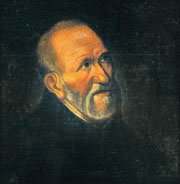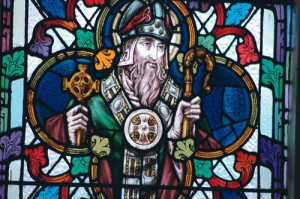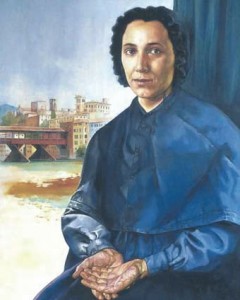Saints for November
Saint Andrew Avellino (1521-1608)
 Lancelot Avellino was born in Naples in 1521. He was at first an ecclesiastical lawyer but was nearly killed by those who were interested in maintaining the disorder of a convent which he had been commissioned to reform. Remorseful for a small lie he had told, he entered the Theatine Order, taking the name of Andrew.
Lancelot Avellino was born in Naples in 1521. He was at first an ecclesiastical lawyer but was nearly killed by those who were interested in maintaining the disorder of a convent which he had been commissioned to reform. Remorseful for a small lie he had told, he entered the Theatine Order, taking the name of Andrew.
He founded houses of this order in several parts of Italy, and his success as a preacher was confirmed by gifts of prophecy and miracle. Andrew was a personal friend and adviser of St Charles Borromeo.
No stranger to physical and mental suffering, he died in 1608 as he was commencing to celebrate Mass.
Saint Andrew, save us from a sudden and unprovided death.
(Source: A new dictionary of saints. Comp. by Donald Attwater. Burns & Oates, Kent 1993)
Saint Laurence O’Toole
(ca. 1125-1180)
 Lorcan Ua Tuathail was born in 1128, probably near Castledermot. He became abbot of Glendalough at the age of twenty-five and archbishop of Dublin eight years later. Laurence did much to spread the canonical life among his clergy, but his reforms were handicapped by the upheavals of the times, in which he had to play an active part as negotiator and peacemaker.
Lorcan Ua Tuathail was born in 1128, probably near Castledermot. He became abbot of Glendalough at the age of twenty-five and archbishop of Dublin eight years later. Laurence did much to spread the canonical life among his clergy, but his reforms were handicapped by the upheavals of the times, in which he had to play an active part as negotiator and peacemaker.
In 1179 he went to Rome for the Lateran Council and was appointed papal legate in Ireland. An attempt on his life failed and, after several journeys as papal legate, a task he carried out with piety, charity and prudence, he died in 1180.
Saint Laurence, help us to fulfil God’s will to the best of our ability.
Blessed Gaetana Sterni
(1827-1889)
 Gaetana Sterni was born in 1827 and lived most of her life in Cassano del Grappa, Italy. Her father, Giovanni Battista Sterni, was a property administrator, and provided a comfortable living for his wife and six children. In 1835 they moved to Bassano where, at eighteen years of age, Gaetana’s eldest sister died, to be followed not long after by her father. At the same time her brother left home, leaving the family in dire financial circumstances.
Gaetana Sterni was born in 1827 and lived most of her life in Cassano del Grappa, Italy. Her father, Giovanni Battista Sterni, was a property administrator, and provided a comfortable living for his wife and six children. In 1835 they moved to Bassano where, at eighteen years of age, Gaetana’s eldest sister died, to be followed not long after by her father. At the same time her brother left home, leaving the family in dire financial circumstances.
Gaetana was forced to grow up before her time. She was an attractive girl, intelligent, sensitive, mature and full of life. Her religious education was solid, guided by the teachings of her mother, her prayers and her frequenting of the church. In her environment, she soon acquired respect and appreciation for her radiant character, full of good sense and her strong feminity.
At age fifteen, she married Liberale Conte, a young widower with three children, filling his home with her vitality, joy and serenity, loving his children as her own. After only a couple of years, Liberale died, leaving her pregnant and his children orphaned again. Completely shattered, she gradually remembered the premonition of Liberale’s death she had experienced while she was in prayer, and she found the faith and strength to carry on. The baby lived only a few days and there commenced a period of bitter widowhood. Her husband’s family did not appreciate the strong links that bound Gaetana to the orphans and many misunderstandings, suspicions and false rumours arose. Eventually she was separated from the children and sent from the family house.
At nineteen years of age, Gaetana returned to her mother’s house. Despite this ordeal, she helped the children to accept the separation. Approachable but strong, she defended the rights of the children, forgave freely and obtained the full reconciliation and serenity of the two families. The suffering did not make her bitter, and her natural sensitivity gave rise to an increased capacity for compassion and solidarity.
Although she prayed to meet the husband destined for her, God showed her he wanted her for himself. For years she faced difficulties, family illness, misfortunes and financial hardship, but managed to keep her life of prayer intact. In 1853, she finally entered the Recovery, a hospice for beggars, to care for the inmates, mostly victims of vice, suffering disorders and abuses of every kind. At the age of 33, she took a vow of total devotion to God and his will.
With unlimited faith, Gaetana gave herself into the hands of God. Her self-giving inspired others and the Congregation, Daughters of the Divine Will, was formed. She died in 1889. Her path to holiness had been: achieve in everything and always that which pleases the Lord, trusting oneself to Him in enlightened confidence, to change only with the force of love all evil into good in the manner of Jesus. Blessed Gaetana, teach us entrust our whole lives to the Lord in complete confidence.
 Entries(RSS)
Entries(RSS)